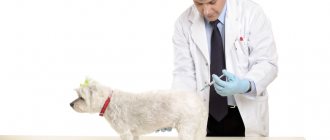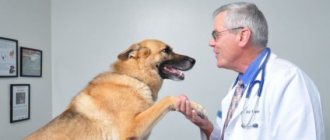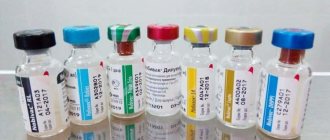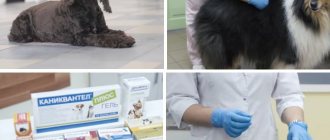Vaccination of animals is a preventive measure that helps prevent major viral and infectious diseases. Animals are vaccinated at an early age to protect them from dangerous infections and viruses. For adult cats and dogs, vaccination helps them remain immune to diseases and maintain strong immunity.
| Animal vaccination | Price |
| Cats, kittens | 1000 rub. |
| Dogs, puppies | 1000 rub. |
How to vaccinate cats or vaccinate dogs.
Vaccination of animals is carried out with different types of vaccines, including complex and mono vaccines. There are special schemes for its implementation, which your veterinarian will tell you in more detail. Depending on the species, breed, age, and habitat of the animal, an individual scheme is selected to take into account all the characteristics of the body and provide complete protection.
When should animals be vaccinated?
The very first vaccination is done at a very early age, when the animal’s body stops receiving immune protection through mother’s milk. During this period, animals are most at risk from viruses and infectious diseases.
Animal vaccinations are the key to health for pets of all ages.
It is young animals that have the highest mortality rate from infections; the worst thing is that treatment in this case is ineffective, and “getting out” such a kitten or puppy can be very difficult. If you have an adult cat or dog, vaccination is still required. Although the body of adult animals is more stable, you should not take risks and “test the strength” of your pet’s immune system.
Infecting an animal with canine distemper
In most cases, infection with canine distemper virus occurs through airborne droplets, but the virus can also be detected in other body secretions (saliva, feces, urine).
Intrauterine infection of puppies from the mother through the placenta is also possible. After infection, a sick animal can secrete the virus for 60–90 days. The virus itself lives in the external environment for up to 6 months. The highest percentage of morbidity in dogs living in the city occurs at the age of 3–6 months, which is associated with the loss of maternal antibodies in puppies. Maternal antibodies are antibodies transferred to the puppy in the first 24 hours after birth with the first sips of maternal colostrum. They are necessary to protect the puppy from viral diseases in the first weeks of life. Maternal antibodies against canine distemper virus can only be passed on to a puppy if its mother either had distemper before pregnancy or was vaccinated against the disease. Maternal antibodies protect the puppy from infection with plague until 2 - 4 months of age, then they disappear, and if the puppy has not been vaccinated against plague, it has a high chance of becoming infected and dying. The period of incubation or development of the virus takes on average 7 days after the virus enters the body. In the first 24 hours after entering the body, the canine distemper virus multiplies in macrophages (cells capable of absorbing and digesting particles foreign or harmful to the body: bacteria, remains of destroyed cells, etc.) and moves in these cells through the lymph nodes to the tonsils and bronchial lymph nodes. From the 4th to the 6th day, the virus multiplies in the spleen, lymphoid tissue of the intestines, stomach and liver. Clinically, this period is accompanied by an initial increase in body temperature and a decrease in the number of leukocytes in the blood (primarily lymphocytes). On days 8–9, the virus enters the tissues of the central nervous system.
Why is animal vaccination necessary?
Primarily for the prevention of viral and infectious diseases. It is much easier to take preventive measures than to engage in expensive treatment later.
Vaccination of animals is necessary for travel and travel. If you are going to take your dog or cat on vacation, you will have to buy a ticket, which is sold if the animal has a veterinary passport with all the vaccinations in it.
The number of cases of viral diseases of dogs and cats registered by veterinarians has begun to decline in the last 10 years, but their number still remains high. The results of research and observations of practicing doctors in many clinics from different cities indicate that the more animal owners began to devote time to preventing diseases of their pets and vaccinating them, the less common previously dangerous infections began to occur in domestic cats and dogs.
Previously, diseases such as “distemper” or “Olympia” were, as they say, “heard of.” There weren’t really any vaccines, just like the culture of vaccination itself, so many dogs and cats died, but this could have been prevented.
To protect pets from the risk of diseases carried by stray cats and dogs, with subsequent transmission to humans, prevention is imperative. Vaccinations of your pets must be done if children, especially preschool age, play and communicate with them. There are diseases, they are called zooanthroponoses - this is a group of diseases that are transmitted from animals to humans, to which children are very susceptible.
When you vaccinate a kitten or puppy, you protect not only him, but also, to some extent, yourself and your family. Agree, this is important, especially since vaccination of adult animals is carried out infrequently - only once a year, and now it is not necessary to go to the clinic for this, the doctor will come, make the vaccination and make the necessary entries in your pet’s veterinary passport.
Treatment of distemper in dogs
The disease is very complex and depending on the stage of progression and damage, there is no 100% cure. The course of canine distemper is unpredictable and depends on the dog’s immunity and the strength of the virus itself. Dogs with good immunity against distemper completely clear their bodies of the virus on the 14th day after infection without showing any clinical signs. Dogs with intermediate immunity form antibodies to the distemper virus on days 9–14 after infection; clinical signs develop in parallel with an increase in the number of antibodies and the clearance of most body tissues from the virus. In such animals, the plague virus persists for a long time in the tissues of the eye, nervous system and outer integument (for example, in the pads of the paws). Recovery is associated with the cessation of release of the virus into the environment. In dogs with low immune status, on the 9th – 14th day after infection, the virus affects many tissues and organs - skin, exo- and endocrine glands, gastrointestinal tract and genitourinary tract. In such dogs, the symptoms of the disease are very severe, the virus remains in the body until death. In this case, the dog suffers severe damage to the central nervous system and in most cases the animal dies. If the dog manages to recover, nervous manifestations (tics, muscle twitching, lack of coordination of movements) may accompany the dog throughout its life.
Treatment of plague, like most viral diseases, is symptomatic. The essence of treatment is to prevent the dog’s body from dying until its body itself defeats the virus. There are no antiviral drugs that can act against the plague virus. The use of immunostimulants is not recommended; instead of being beneficial, on the contrary, they can provoke an increase in the severity of the disease and the manifestation of a nervous form.
Treatment for canine distemper consists of:
- infusion therapy (intravenous fluid) for dehydration due to vomiting, diarrhea, fever, etc.
- antibiotic therapy for the prevention and treatment of secondary bacterial infections, because the body weakened by the virus is extremely susceptible to infection by bacteria.
- if vomiting develops, use antiemetic drugs.
- if seizures develop, use anticonvulsants. Often the animal needs to be put into medicated sleep for several hours or days.
Usually drugs are administered in the form of droppers and intramuscular injections. The use of tablets often does not help, since plague disrupts the functioning of the stomach and intestines, that is, the benefit from oral administration will be minimal.
Types of vaccines and vaccinations.
Vaccines for animals are either “mono” or “complex”. A mono vaccine will protect the body from any one disease.
The most famous mono vaccine is the anti-rabies or “anti-rabies” vaccine; it is its presence that is checked in animals’ passports when traveling. Complex vaccines, as the name implies, can protect the body from several diseases at the same time; it is very good that, with just one injection, you can protect your pet from all major diseases.
Based on the manufacturer, all vaccines can be divided into domestic and imported. Imported ones are divided by country of production, the most famous and most frequently used in our country are Nobivac (Netherlands), Zoletis (USA), Merial (France). These are high-quality and proven manufacturers, whose vaccines are used to vaccinate animals in almost all clinics.
What vaccinations do pets need?
Vaccination - what is it, when and who should do it, what does it protect against, do outbred animals need it, is there a single vaccine for all diseases?... These and other questions are asked most often in a veterinary clinic, so we decided to collect everything here answers and tell everyone that vaccination is necessary for everyone.
So, vaccinations are needed not only for people, but also for animals in order to avoid serious infectious diseases and serious consequences from them. In Russia, vaccination of pets is mandatory only for transporting them on public transport or crossing the state border. Those pets that do not travel often remain unvaccinated, which is a pity. In many European countries, vaccines against diseases such as rabies or leptospirosis are mandatory for pets.
Vaccines come in different types: monovalent (against one disease), bivalent (against two diseases), polyvalent (against several diseases).
It is more convenient to use complex vaccines: it is faster, cheaper and develops immunity against several diseases at once, thereby protecting your pet as much as possible.
Vaccines can also be divided into modified live and non-activated (killed) vaccines. Of course, “killed” ones are considered safer for the animal, but their effectiveness is several times less than that of “live” ones. It’s up to you to decide which vaccine to get, but doctors recommend “live” ones, since they form strong immunity in animals.
Vaccines are either Russian-made or foreign. Veterinarians do not see much of a difference and consider the storage and transportation factor to be more important, since the vaccine must have a good shelf life and be stored at a certain temperature. If you vaccinate your pets at the clinic, pay attention to where they get the ampoule, because it should be in the refrigerator. Don’t be afraid to refuse the vaccine if something bothers you, because this is the life and health of your dog or cat!
One way or another, before getting vaccinated, you need to consult a doctor. It is he who should, based on his age. weight, breed, availability of other vaccinations, general condition of the animal and goals, choose the best individual option.
When should dogs be vaccinated? At the age of 8 to 9 weeks, they are usually vaccinated against plague, leptospirosis, enteritis, and hepatitis. Just one injection and your puppy is protected from all these terrible diseases. It is important to note that after about a month this complex vaccination must be repeated, adding the rabies vaccine. At the age of one year, the third revaccination is performed. Then - every year.
When should cats be vaccinated? The first vaccination against calicivirus infection, rhinotracheitis and panleukopenia is needed for cats at 10-12 weeks. Then we wait a month and repeat this vaccine, adding, like puppies, a rabies vaccine. Then we repeat the polyvalent vaccine annually.
It is important to note that after vaccination against the relevant diseases, the animal develops immunity no earlier than after a week, or even two. Sometimes this period passes calmly, and often with fever, lethargy and even vomiting. If this suddenly happens, go to the veterinary clinic where the vaccination was performed for treatment.
We can definitely recommend the Don Veterinary Hospital as a clinic where they provide high-quality vaccinations, where they carefully monitor storage and expiration dates.
I would also like to tell you that in addition to vaccination, you can get absolutely any services here: from consultation to surgery in case of a fracture of the femur in a dog, or a fracture of the spine in a dog, or a fracture of the femur in a cat, or in case of any other serious injuries that require complex surgical intervention. This is where the best specialists in the city perform spine surgeries on dogs and cats. Yes, this is where people most often go for injuries to the femoral neck, pelvis or distal bones, fractures of the paws, intervertebral hernias, damage to the discs of the spinal column and even some parts of the spinal cord. To save a limb, for example, it is often necessary to resort to osteosynthesis or reposition.
You can find out about the cost of surgery for a dog or the cost of surgery for a cat by phone or on our website www.donvet.ru.
We can proudly say that the clinic’s veterinarians always do everything possible to save the animal’s life and return it to a healthy state, the ability to walk and enjoy life.
By the way, on our forum you can get free consultations from specialists at the Don Veterinary Hospital.
“Donskoy Veterinary Hospital” is open daily at the address: Rostov-on-Don, st. Sorge, 40A (in the center of the western microdistrict). Opening hours: from 10:00 to 20:00.
We welcome your feedback.
Full list of services and prices here. You can find out how many rubles. costs consultation, sterilization, castration, vaccination, etc.)
How to prepare for vaccination?
Before vaccination, all animals are given antiparasitic drugs; they can be in the form of tablets, suspensions or drops. 10 days before you get ready for vaccination, buy an anti-worming product at a veterinary pharmacy or pet store.
These drugs are available from different manufacturers, it doesn’t really matter what brand, the main thing is that the drug you choose is against all types of helminths. This is necessary for the body to be free of parasites; in this state, the immune system will be most ready to develop an immune response.
Vaccination is given only to healthy animals. Before vaccinating a cat, your veterinarian will conduct an examination. If there are no health problems, he will get vaccinated and issue a veterinary passport.
Vaccination of animals in Rostov-on-Don.
In our clinic, your pet can be vaccinated with both imported and domestic vaccines. After vaccination, a veterinary passport is issued, which will contain the necessary notes on the vaccinations performed.
For kittens and puppies, we offer home vaccination services. A veterinarian will come, examine your pet, vaccinate, issue and issue a veterinary passport. You can vaccinate at home not only for young but also for adult animals; you can call a veterinarian by calling our phone number.
Veterinary certificate form 1
The most important document required to go on a trip with your beloved animal is a veterinary certificate (certificate) in form No. 1. This is a guarantee of your pet’s health and permission to cross borders unhindered. When traveling abroad, the Form 1 certificate must be exchanged for an international veterinary certificate Form 5.
Step 1 - Medical examination and rabies vaccination
The first step on the path to the coveted certificate is a visit to the veterinarian - no later than 30 days before departure
! The doctor will need to conduct a medical examination of your pet, give it a rabies vaccination and make a note of vaccination in the animal’s international passport. You can undergo all these procedures either at a state veterinary clinic or a private one that has permission to vaccinate animals against rabies.
If your furry friend does not have a passport, do not worry - the document (as well as the microchipping procedure) can be done on the day of vaccination.
Step 2 - obtaining an F1 certificate
30 days after vaccination, you and your pet will need to visit a veterinary clinic again, this time a public one
, where your friend will be thoroughly examined again and a certificate will be issued in Form 1. In some cases, veterinary clinic staff allow an examination of the animal and the issuance of a veterinary certificate at home. Of course, in this case, you must provide the veterinarian with fresh records in your veterinary passport about preventive procedures and vaccinations.
Certificate F 1 contains the owner’s full name, full information about the animal, dates of preventive measures carried out, a quarantine mark and an approximate route. The finished document is certified by the doctor’s signature and a wet seal.
Conditions for issuing an F1 certificate
The main indicators for issuing a pet certificate are:
- Satisfactory state of health;
- Availability of a veterinary passport;
- Timely implementation of appropriate vaccinations and vaccinations;
- Completing the microchipping procedure in circumstances where the owner and the animal are planning to leave the country.
Validity period of veterinary certificate form 1
Certificate Form No. 1 is valid for five days from the date of receipt, so it is worth considering a plan of action in advance so that the documents do not lose their relevance at the time of departure.
Typically, the period for issuing a permit document takes from one to three days (it makes no difference whether you visited the clinic with your pet or called a doctor to your home). And don’t forget that the animal must be vaccinated no later than 30 days before departure!
If you want to save time, you can contact one of the companies that provide assistance in obtaining an F1 certificate. The fixed price includes registration of a certificate, preventive examination, as well as tests and vaccinations.
Rules for obtaining certificate form No. 1 for taking a pet abroad
First, you need to contact the embassy or consulate of the host country and request the requirements for transporting animals in writing, since the conditions for importing furry travelers are different for all countries. To travel around Russia, it will be enough to vaccinate your pet against rabies, but for pets traveling to EU countries, it is necessary to additionally vaccinate against echinococcosis, and then obtain a European-style F1 certificate from the appropriate authority.
If your pet gets sick before traveling
If your pet is a little sick at the time of the examination, do not despair! The veterinarian will prescribe home treatment and care for him. Sometimes, during quarantine, doctors may need to check the pet’s place of residence - therefore, the veterinary commission may visit you during the preparation of documents to collect information about the conditions of keeping the tailed patient. In this case, a veterinary certificate of form No. 1 is issued only upon completion of the quarantine procedure.
This is important to know:
- No clinic will issue a Form No. 1 certificate for an animal that has not been vaccinated against rabies.
- Pets under three months of age are also not issued a veterinary permit;
This industry is strictly controlled by Rosselkhoznadzor and systematically amends legislation in the field of veterinary medicine. Therefore, every time before you go on a long journey, check the latest information.
Easy travel preparation for you and your furry friend!










